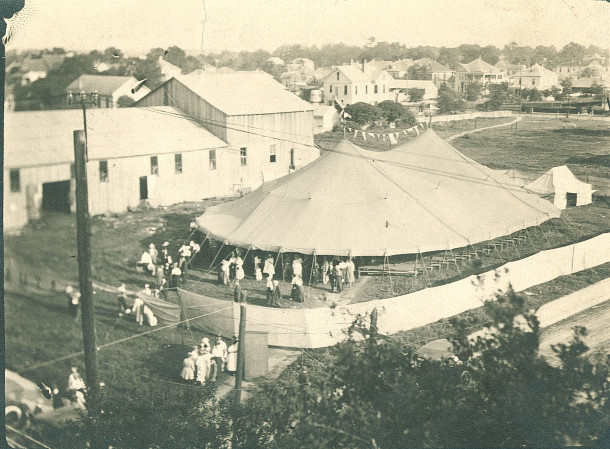
While we have been distracted about the start of school, whether it will be in-person or on computers, and concerned about all the new cases of Covid, I thought a look at 1920 would be enjoyable.
The Great War was over, the economy was fairly stable, and Chautauqua came to town. Actually here in Texas and other parts of the South, it came earlier as the weather would be too hot in August. You see, Chautauqua was an outdoor event featuring musicians, magicians and ventriloquists, as well as speakers advocating prohibition and candidates for various political offices.
Usually everyone gathered under the large tent erected just south of the First Baptist Church. The new Lee Street Methodist sometimes was the venue of entertainment. In fact both new Methodist Churches, Lee Street and Kavanaugh, sponsored the event over the years. If twenty local citizens guaranteed three dollars to the Chautauqua Foundation, Greenville could have outdoor summer entertainment. Yes, the community had a lovely theater in the King Opera House, but wit no air-conditioning there. It would be like sitting in an oven.
In 1920 Chautauqua began on June 26 for 5 days. That year someone lectured about the “Prophesy of the Present Unrest”. Another topic was “Saving the Victor.” An Irish love comedy “Gal 0’ My Heart” entertained everyone. A soprano from the Chicago Grand Opera performed. And four men gave lectures. If some one who bought a ticket was unable to attend, that person found a college student who would enjoy the performance. After all, Greenville was home to three colleges at that time.
At some time of its existence, the Comedy Male Quartet created lots of laughs. Henry Clark lectured on the subject of “Play Ball”, a very exciting sport in Greenville at the time. But probably the most famous orator was William Jennings Bryan, who ran for President of the United States in four national elections. By losing four times, Bryan gave up in 1912 and took to the Chautauqua fete.
Nine U. S. Presidents spoke around the country, yet never in Greenville. But our citizens enjoyed operas, plays, art classes, classes on religion, and musical lessons. At one point, in another Southern state, the Ku Klux Klan joined in performing. However, it was definitely not successful.
In 1874 in northwest New York State Lewis Miller and John Vincent started a summer camp for Sunday School teachers at Chautauqua. Miller was a wealthy industrialist and inventor. Vincent was a Methodist minister responsible for coordinating Methodist Sunday Schools who was a talented speaker. Their idea caught on nationwide. At the peak of their work, there were 10,000 committees or sponsors.
By the 1930s Chautauqua had lost its luster. Radios and the financial depression put an end to summer entertainment held outdoors.
Miller described his work as “being middle class culture and education that would define them and set them apart from the lavish and conspicuous squandering of wealth among the very rich, and the squalor of the very poor.”
